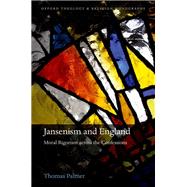Jansenism and England Moral Rigorism across the Confessions
, by Palmer, Thomas- ISBN: 9780198816652 | 0198816650
- Cover: Hardcover
- Copyright: 5/8/2018
Jansenism and England: Moral Rigorism across the Confessions examines the impact in mid- to later-seventeenth-century England of the major contemporary religious controversy in France, which revolved around the formal condemnation of a heresy popularly called Jansenism. The associated debates involved fundamental questions about the doctrine of grace and moral theology, about the life of the Church and the conduct of individual Christians. Thomas Palmer analyses the main themes of the controversy and an account of instances of English interest, arguing that English Protestant theologians who were in the process of working out their own views on basic theological questions recognised the relevance of the continental debates. The arguments evolved by the French writers also constitute a point of comparison for the developing views of English theologians. Where the Jansenists reasserted an Augustinian emphasis on the gratuity of salvation against Catholic theologians who over-valued the powers of human nature, the English writers examined here, arguing against Protestant theologians who denied nature any moral potency, emphasised man's contribution to his own salvation. Both arguments have been seen to contain a corrosive individualism, the former through its preoccupation with the luminous experience of grace, the latter through its tendency to elide grace and moral virtue. These assessments are challenged here. Nevertheless, these theologians did encourage greater individualism. Focusing on the affective experience of conversion, they developed forms of moral rigorism which represented, in both cases, an attempt to provide a reliable basis for Christian faith and practice in the fragmented intellectual context of post-reformation Europe.







